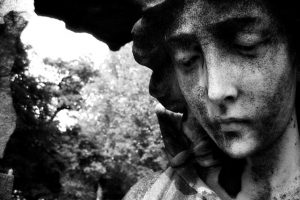 As this pandemic drags on, I find that moments of hope and gratitude are interspersed with times of deep grief and frustration. At one level, some of us have fallen into a groove with working from home. We are being intentional about connecting with friends and family, and cultivating community as safely as possible. We may have additional time for prayer, or rest, learning, or creativity. We appreciate communal efforts at loving our neighbor. Goodness is shining in the darkness. At another level, some of us may be stretched to breaking points with work or family expectations, perhaps compounding stresses already simmering before the pandemic was upon us. We may have lost loved ones without proper closure, or supported people who are sick, or worried about the possibility of becoming sick. Economic worries may have us mourning the loss of stability. The character of public discourse can be disheartening. While certain elements of public life may be opening now, we are still a long way from saying that danger has passed. Uncertainty remains.
As this pandemic drags on, I find that moments of hope and gratitude are interspersed with times of deep grief and frustration. At one level, some of us have fallen into a groove with working from home. We are being intentional about connecting with friends and family, and cultivating community as safely as possible. We may have additional time for prayer, or rest, learning, or creativity. We appreciate communal efforts at loving our neighbor. Goodness is shining in the darkness. At another level, some of us may be stretched to breaking points with work or family expectations, perhaps compounding stresses already simmering before the pandemic was upon us. We may have lost loved ones without proper closure, or supported people who are sick, or worried about the possibility of becoming sick. Economic worries may have us mourning the loss of stability. The character of public discourse can be disheartening. While certain elements of public life may be opening now, we are still a long way from saying that danger has passed. Uncertainty remains.
Liturgically speaking, the pandemic has come upon us in the midst of the Lenten and Easter seasons. While Lent may have provided an appropriate space to embrace and express the suffering of the moment, now that we are into Easter time, we may feel pressure to be rejoicing, to be the Alleluia people Christians are called to be. And yet, the grief is real. The need for lament is real. Where can this happen? How do we give voice to this spiritual movement?
In monastic communities, we pray the Liturgy of the Hours as a matter of course, and the Psalms in particular give us a good mix of expression of both praise and lament. At my own house, we are without the mass, and will be for some time yet. The Psalms thus have become more poignant, more personal. What better words with which to cry out to God than both the plea and the trust implicit in Psalm 31:
In you, Lord, I take refuge;
let me never be put to shame.
In your justice deliver me;
incline your ear to me;
make haste to rescue me!
Be my rock of refuge,
a stronghold to save me.
You are my rock and my fortress;
for your name’s sake lead and guide me.
Or Psalm 28:
To you, Lord, I call;
my Rock, do not be deaf to me.
If you fail to answer me,
I will join those who go down to the pit.
Hear the sound of my pleading when I cry to you,
lifting my hands toward your holy place.
While the Liturgy of the Hours is the official prayer of the Church, many people are unaware of how to participate in this prayer. It really ought to be better-known as a prayer for the people, not just for the priests and religious. Parish- and monastery-based introductions to the riches of the Liturgy of the Hours would be worth promoting. More accessible, of course, are the Psalms and scriptural books like Job or Lamentations themselves. We can pray through these alone or in small groups in study or in the meditation of lectio divina. Providing context or background study my be helpful.
Given the global reach of this experience, it seems some communally-based liturgy of lament is needed. Perhaps it cannot be enacted fully until we also are able to gather again; or perhaps now is the time, given a dispersed means. How can the Church help us give voice to the grief and pain that the times have thrust upon us? And how can the Church lead us through the pain to the deeper comfort of knowing that Christ is our shepherd, that God cares for us, that we are seen and known and loved in the midst of isolation and deprivation?

Leave a Reply